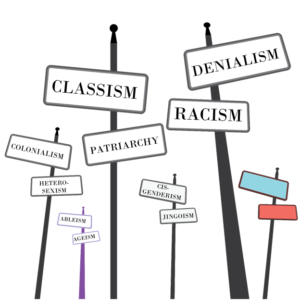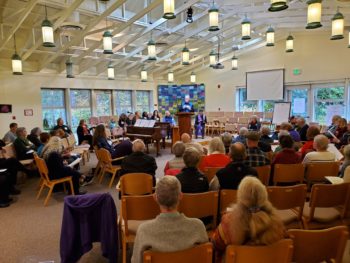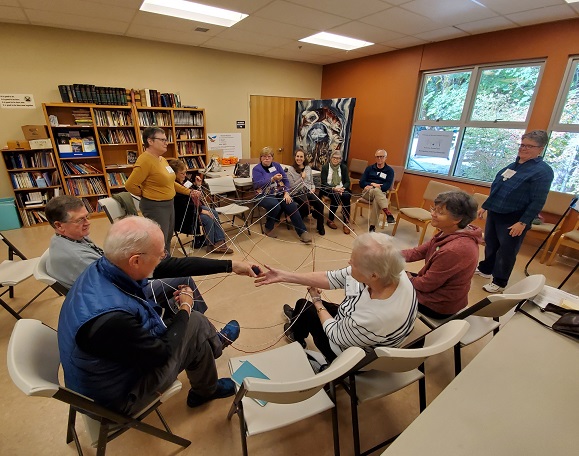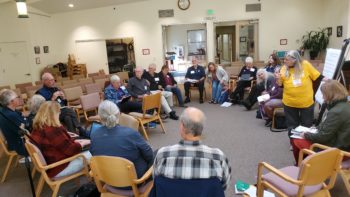Navigating Intersectionality
Northwest Justice Summit – A Retrospective
 The 2019 Pacific Northwest Justice Summit served more than 100 faith leaders from 20 congregations. UUs and other faith-based activists began arriving Friday evening, October 11th, and weary travelers were welcomed with dinner provided by our hosts at Olympia UU Congregation.
The 2019 Pacific Northwest Justice Summit served more than 100 faith leaders from 20 congregations. UUs and other faith-based activists began arriving Friday evening, October 11th, and weary travelers were welcomed with dinner provided by our hosts at Olympia UU Congregation.
Quick links:
– Program Schedule – 2019 Summit
– Thanks to our Sponsors!
– Become a Sponsor of the 2020 Summit
Friday evening’s pre-event began with the profound honor of hearing Willie Frank III (Nisqually Tribal Council) and Peggen Frank (Executive Director of Salmon Defense .) They each gave personalized reviews of the documentary film, As Long As Rivers Run, revealed some of how their personal lives related to those events, and shared their calls for action to protect the rights of indigenous people and with them our natural world.
As a beautiful Fall morning dawned on Saturday, October 12, Summit attendees from across Washington and northern Oregon launched the summit with an early morning traveling feast featuring Justice Fair exhibits, light breakfast, and presentations from the following important organizations: Backbone Campaign, Earth Ministry, Meaningful Movies Project, OUUC Learning Right Relations Team, RESULTS, Sierra Club, UUs for Justice in the Middle East, UU Ministry for Earth, UUs for a Just Economic Community. Thanks from all Summit attendees to these organizers who provided information and insights about their good work to heal the world.
Opening and Worship: As we readied to officially open the 2019 Justice Summit, we expressed our gratitude and commitment to the indigenous peoples on whose occupied land we were meeting, and then joined our voices in song. Rev. Mary Gear, Olympia UU Congregation’s newly called minister, followed with an inspiring homily that challenged participants to recognize and adapt to the profound implications of intersectionality for our personal lives, for our advocacy, and for our efforts to work with and follow the lead of oppressed folx. Rev. Gear reminded us of a traditional image of jewels woven into a tapestry, noting that movement of any jewel compelled movement in all of them. This image, akin to the Unitarian Universalist 7th principle of interdependence, proved a foundational aspect of intersecting oppressions, power systems, and relationships which we would explore during the rest of the summit.
 Plenary 1, Intersectionality: Challenge & Invitation: Ruth Idakula and Rev. Deanna Vandiver led Summit attendees through the development by Dr. Crenshaw of the concept of intersectionality, as the simultaneous experience of overlapping sources of discrimination — A concept of magnifying oppressions that can apply to a single individual as well as to groups of individuals. Part of this plenary was devoted to breakout sessions where participants represented how multiple identities, are subject to privilege or oppression from their identities, and are inextricably connected to each other by these intersecting webs of oppression and privilege. Idakula and Vandiver challenged us to imagine a moment of collective liberation and to consider what had to change in ourselves, in our perceptions of others, and in our imagined world to support such collective liberation. Coming back together, we ended the morning embodying the truth that we all rise or fall together. Anyone’s oppression holds us all back. Everyone’s liberation moves us all forward. PlenaryNotes. Breakout Notes. A power point of this plenary will be posted soon.
Plenary 1, Intersectionality: Challenge & Invitation: Ruth Idakula and Rev. Deanna Vandiver led Summit attendees through the development by Dr. Crenshaw of the concept of intersectionality, as the simultaneous experience of overlapping sources of discrimination — A concept of magnifying oppressions that can apply to a single individual as well as to groups of individuals. Part of this plenary was devoted to breakout sessions where participants represented how multiple identities, are subject to privilege or oppression from their identities, and are inextricably connected to each other by these intersecting webs of oppression and privilege. Idakula and Vandiver challenged us to imagine a moment of collective liberation and to consider what had to change in ourselves, in our perceptions of others, and in our imagined world to support such collective liberation. Coming back together, we ended the morning embodying the truth that we all rise or fall together. Anyone’s oppression holds us all back. Everyone’s liberation moves us all forward. PlenaryNotes. Breakout Notes. A power point of this plenary will be posted soon.
Plenary 2, Intersectionality: Meeting the Challenge: After refortifying ourselves with good conversation and tasty meals-in-peels over lunch, Rev. Carol McKinley chaired a panel of justice leaders, each of whom had taken on the challenge of intersectionality in their justice work in the greater Olympia community and beyond. The panelists included: Steve Tilly from Justice Not Jails (working with the county defense and prosecutors), Mary Ybarra from the Washington state Poor Peoples’ Campaign, Ivy Gentian, a youth climate activist; and Tim Ransom talking about Quixote Village Project and other local initiatives to address  homelessness. Summary Notes.
homelessness. Summary Notes.
Issue Cluster Breakout Sessions: Mid-afternoon, Summit participants chose to participate in one of four issue sessions to learn more, share informationabout upcoming activities, and to consider how awareness of intersectionality can inform and strengthen our justice work. Most sessions included a quick sharing of important upcoming activities, summaries of key intersectionality aspects related to their issues, open discussions of lessons learned, and best practices and challenges regarding intersectionality within each issue cluster. These issue breakouts included:
- Civil and Criminal Justice Systems facilitated by Julia Cochrane; Session Report
- Democracy Imperiled, facilitated by John Hilke; Session Report
- Economic Justice, facilitated by Amy Moses-Lagos; Session Report
- Environmental Justice, facilitated by Deb Cruz; Session Report
Keynote: To close our summit, Juan Alaniz gifted our Summit participants with his personal perspectives on the importance of intersectionality, which he tempered with understanding and compassion. He spoke of his work in healthcare administration and how it led him to his role as Diversity, Equity, and Inclusion Manager for the WA State Health Care Authority. He pointed out that incorporating intersectionality is essential for the future. He also emphasized that it is work that cannot be rushed. It is a life’s work that requires nurturing as well as patience. Doing so offers great rewards for both individuals and society. Learn from his Power Point coming soon here!
Upon Reflection: As summiters readied to hear Juan Alaniz close out the summit, each paused to answer three questions that are traditionally posed at each summit:
Read their honest and inspiring responses in the links above.
Want to know more? Olympia UU Congregation recruited volunteer reporters to prepare reports or reviews of each major session of the 2019 summit. As these reports are received, we will post them online and link them back to this overview and cross reference them to other parts of our website. We encourage you to explore these resources, AND to join us next year for the 10th Annual Justice Summit in 2020.
Special Thanks to our 2019 Summit Sponsors
Quick links:
– Program Schedule – 2019 Summit
– Thanks to our Sponsors!
– Become a Sponsor of the 2020 Summit